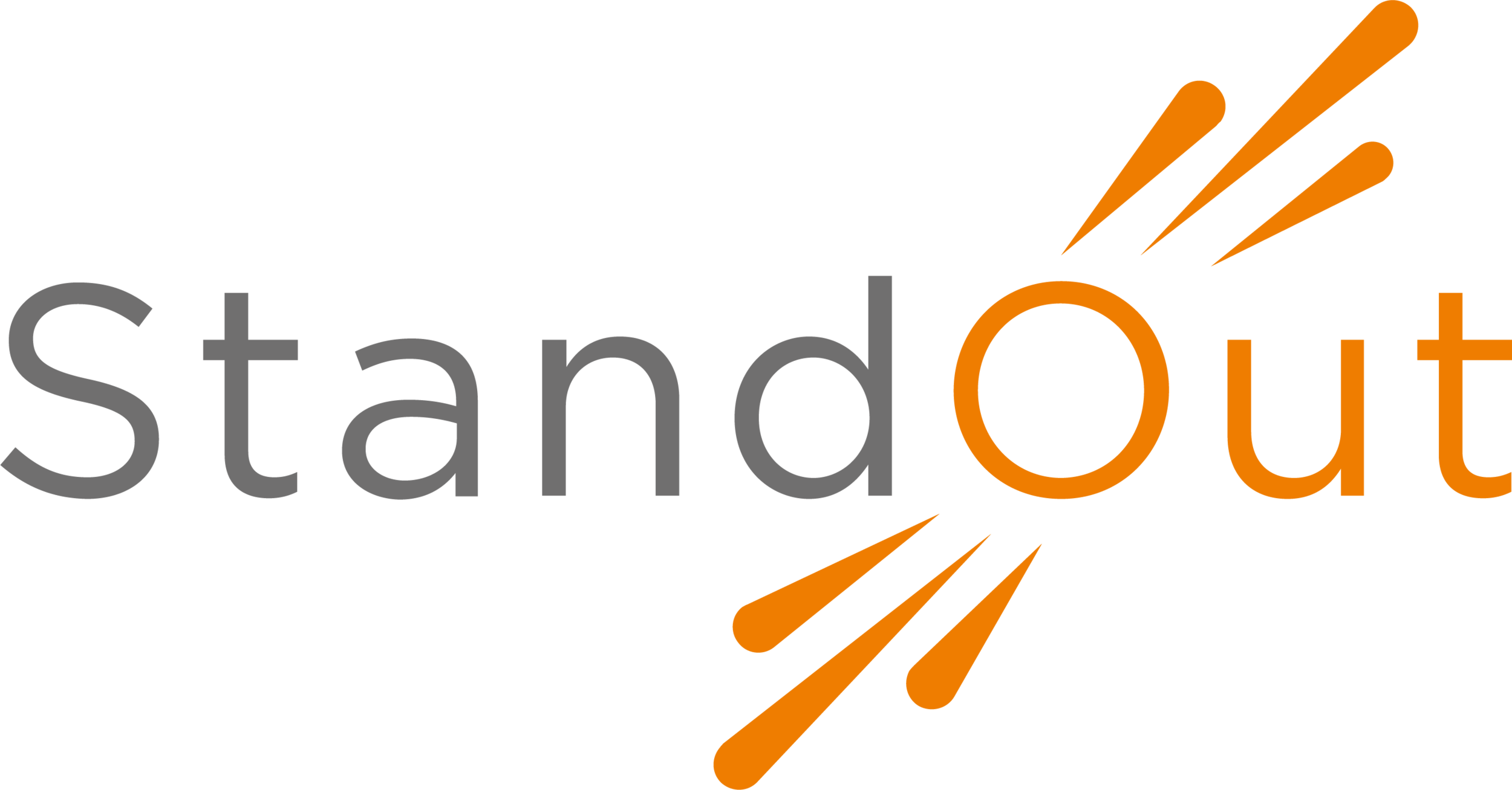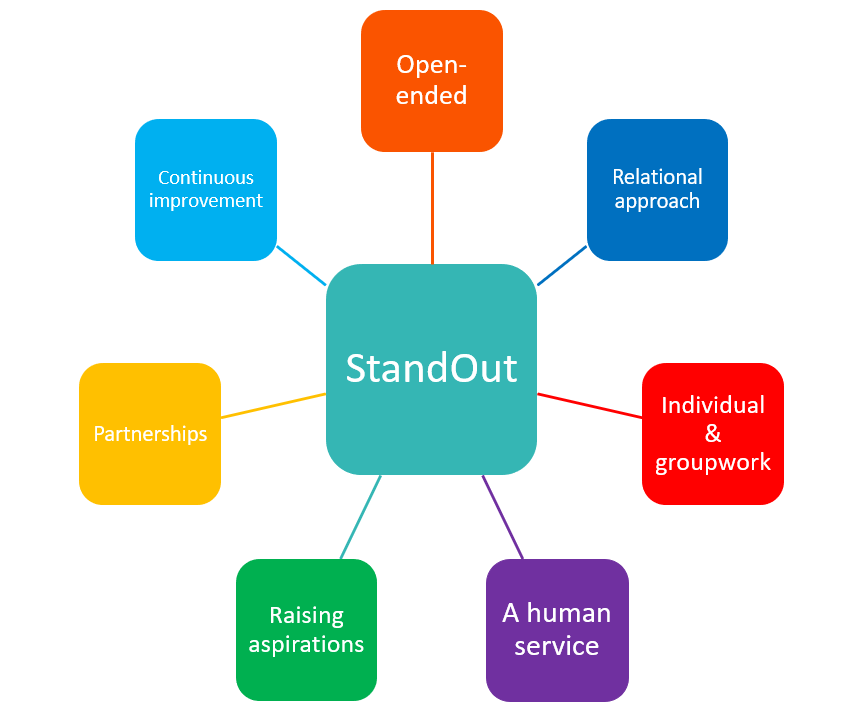StandOut a “unique and high quality programme”
By Russell Webster
StandOut has always known that it isn’t perfect and that it has to work hard to keep improving, to get better at meeting the needs of the people it works with. Recently, we commissioned independent expert, Russell Webster, to evaluate our work to help us identify our strengths and weaknesses. You can read the evaluation report here. In this post, Russell reflects on the evaluation.
One of the first things that I had to do when starting the evaluation was to get a full understanding the StandOut programme itself. This is usually a fairly straight forward process, but with StandOut it proved to be both more complicated and much more interesting than usual.
StandOut is usually presented as an employment resettlement service; the focus on getting a job on release is easily understood and categorised by both prisons and people in prison. The fact that employers who are willing to recruit people with a criminal record come into the prison to talk about the opportunities on offer is a key enticement for people to opt into the programme.
However, throughout the course of the evaluation which included observation of groupwork sessions, lengthy conversations with the organisation’s coaches, prison governors and staff, other stakeholders and gathering the views of 58 programme participants, I came to understand that StandOut is so much more.
The coaching and relational focus, the continuous individualised support both in prison and on release and the open-ended model which includes helping people access the widest range of services possible to address their own issues are all components which are rarely found in a prison employment scheme, at least to the extent that StandOut provides them. Of course, finding work and building a career can be critical to successful resettlement and a move away from a criminal lifestyle. But StandOut developed close, long term relationships with participants and seemed to me to be much more than helping someone to get a job, it was about giving people the skills and self-worth to live a life they were proud of.
“StandOut developed close, long term relationships with participants and seemed to me to be much more than helping someone to get a job, it was about giving people the skills and self-worth to live a life they were proud of.”
Outcomes
What people want to know most of all from a programme evaluation is: does it work? Well StandOut does work. The key distinguishing feature of the programme is its commitment to provide ongoing support to people on release. More than eight out of ten (176 = 81%) of the people who have participated in the programme and been released from prison have been in contact with StandOut in the community. This is an unusually high rate of continuity of care through the prison gate.
StandOut were able to identify 61 participants who had found work, many of these individuals had found more than one job (up to five) and a total of 110 jobs were recorded. This represents almost two in five (39%) of programme participants released from prison. This compares very favourably with the latest national data which found that an average of 23% of people released from prison found work within six months. It should also be noted that the employment figure for those released from local/remand prisons such as the two establishments in which StandOut works is substantially lower than this average.
The organisation also measures the impact of the programme on mental wellbeing and here again, the results were positive with 84% people completing the programme reporting an improvement in this critical area.
Critical success factors
The stakeholders I interviewed identified four critical success factors of the programme:
1. The individualised approach – stakeholders described the programme as being very focused on the participants and offering an approach that helped participants overcome their individual problems, rather than a generic one-fits-all model.
2. There was general approbation that the programme was seamless, continuing after programme delivery in prison and, critically, on release into the community.
3. The overall positive mindset of the programme was mentioned by many stakeholder interviewees, who discussed the organisation’s focus on building self-confidence and resilience.
4. Finally, a number of interviewees talked about StandOut’s willingness and desire to work in partnership with any other organisations that could help its participants. Interviewees talked about a different level of partnership work.
Participants’ views
Of course, the most important component of any evaluation is the views of the programme’s end users. Participants were extremely, almost universally, positive in their views of the programme. They identified three defining characteristics of the programme which they praised: the level of support provided, the continuity of care on release and the dedication and commitment of staff. These views are illustrated by the following quotes transcribed from my interviews:
“StandOut have been great, they support you when you’re locked up and when you get released. I was generally surprised how they were always there for me when it felt like no one else was.”
“I was made to feel that even though I was in prison, I could still achieve and better myself. StandOut helped me stay motivated and positive, which gives people hope that even after prison they can still achieve and live a prosperous life.”
“It has given me confidence to apply for work and not hold back to apply because of my criminal record, I did gain employment after release and I don’t think I would have even tried to apply for the job if I had not done the StandOut course inside prison.”
“It was much better than fluffy, feel-good courses which don’t look at barriers and how to overcome them”
“I got sectioned at one point but they came to see me at the hospital. I don’t think I would still be alive, if it wasn’t for their support and belief in me.”
“I'm still in employment because of them. StandOut were there, they were genuine, they stuck by me.”
“They’ve walked along my journey with me every step of the way”
Conclusion
At the end of the evaluation, I concluded that StandOut has developed an effective holistic resettlement model which is valued by prisons, partner organisations and, most importantly, by the participants themselves. The programme is unique in its approach and has proved successful in engaging participants on release and in helping them find work and supporting them in resolving a wide range of difficulties.
I developed a simple graphic to summarise the key components of the StandOut approach which you can see below.

